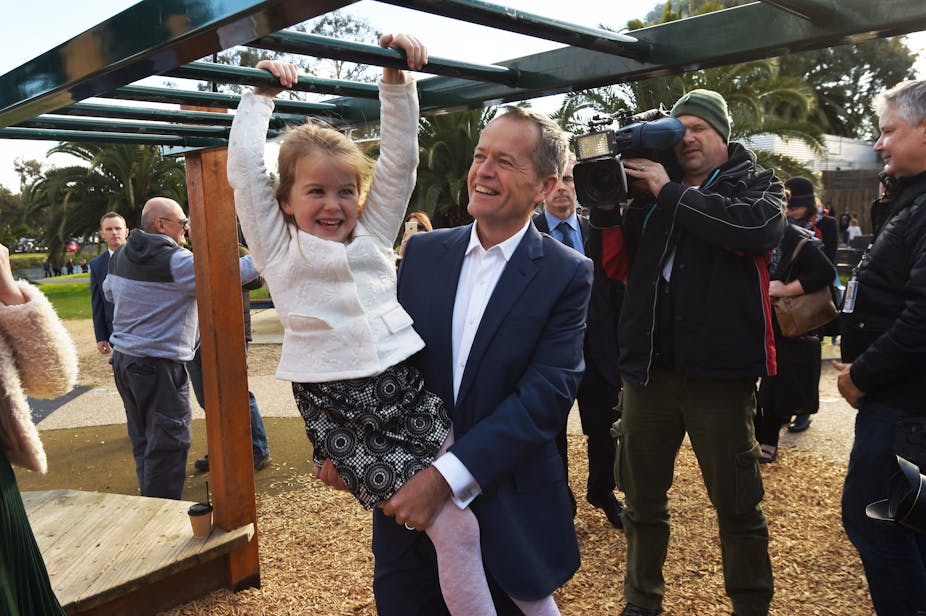In an election full of drama, it is still remarkable that media speculation on Sunday was not about whether Malcolm Turnbull’s leadership might be shaky, but the possibility of a challenge to Bill Shorten.
One reason, perhaps, is that while some Liberals would like Turnbull replaced there’s no immediate alternative except Tony Abbott – and that would be a bad joke.
In Labor it’s different. It’s hardly a secret that Anthony Albanese, who ran unsuccessfully in 2013, hankers for the leadership. He was carefully positioned in the last term when there was speculation Shorten might be removed. He has been match-fit in the event Shorten did poorly on Saturday. But Shorten much exceeded expectations, and the result, hovering between a hung parliament and a small Turnbull majority, is very much better for Labor than even its senior figures anticipated.
Obviously if the parliament came in hung and Shorten proved the more effective suitor of the crossbenchers, that would be the end of leadership talk. But even if Turnbull emerged the winner, in a majority or a minority Coalition government, why – given Shorten’s achievement – would a challenge even be thought about?
First, because under the party rules the leadership, in which caucus and rank-and-file have a 50-50 say, is thrown open automatically after a Labor loss.
Second, now the leadership is a real prize. With a minority Turnbull government or one with a wafer-thin majority anything could happen anytime.
The Shorten-faces-challenge kite was deliberately flown in the media after Saturday’s election. It was mischief, but produced a sharp reaction from Labor figures. With the possibility of a minority Shorten government still live, it looked like gross disloyalty – undermining Shorten if things got to the point of his negotiating with the crossbenchers.
If the result went the Liberals’ way, any move against Shorten would still appear expedient and be divisive. Asked about the speculation, Shorten could mean what he said on Sunday: “I have never been more certain of my position.”
The Shorten camp would have liked Albanese to have quashed the chatter immediately. He hasn’t done that. But a well-placed senior source said: “I’d expect Bill to be unopposed”. Another said Albanese would be “crazy” to put his name forward. “Amongst the rank-and-file Shorten is a hero today.”
When we think back to the lows of Shorten’s leadership during the last term – his ordeal before the trade union royal commission, his roc- bottom approval when Turnbull’s was soaring – how far he’s come is all the more impressive.
Under his big-target strategy he had Labor on the front foot with bold policies. In the campaign he mostly looked better on the hustings than Turnbull.
But, nevertheless, there were question marks over Shorten’s campaign – not ones of day-to-day performance but the strategic decisions. Not the Medicare scare – an example of ruthlessly effective expediency – but the big spending program, and the decision to have deficits over the forward estimates larger than the Coalition’s.
Labor would be foolish to allow its strong result to convince it that it doesn’t need to do some hard thinking about the appropriateness of its economic approach.
Shorten’s position if he remains in opposition is as safe as houses. But the story of modern Australian political leaders is that you have to keep proving yourself. There is little patience when those polls slip. Shorten is fortunate in that Turnbull and the Coalition, if in government, would be in a dire position. The Liberals are deeply divided, ideologically and over Turnbull himself. Turnbull downplays ideology while those on the right want to accentuate it.
If Labor remains in opposition, the warmth of relative success will engulf Shorten for some time as Turnbull suffers and struggles. But inevitably the spotlight would come back sharply on to Shorten. Labor’s rules make revisiting the leadership during the term difficult but not impossible.
In a strange way, bringing his party so close to victory, while giving short-term protection, would build in longer-term vulnerability because the stakes become so high. To stay safe Shorten would need to have his eyes on the next campaign and what would be appropriate for that. He once more would have to get out in front of the game.

